Peoples' Democratic Party (Turkey)
Peoples' Democratic Party Halkların Demokratik Partisi | |
|---|---|
_logo.png) | |
| Abbreviation | HDP |
| Chairman | Selahattin Demirtaş |
| Chairwoman | Figen Yüksekdağ |
| Honorary Presidents |
Ertuğrul Kürkçü Sebahat Tuncel |
| Spokesperson | Ayhan Bilgen |
| Founded | August 12, 2012 |
| Headquarters | Adakale Sok. 23/3 Kızılay Çankaya, Ankara, Turkey |
| Membership (2015) | 30,295[1] |
| Ideology |
Democratic socialism[2][3] Regionalism/Minority rights[4] Political pluralism[5] |
| Political position | Left-wing[6] |
| National affiliation | Peoples' Democratic Congress (HDK) |
| European affiliation | Party of European Socialists (associate)[7] |
| International affiliation | Socialist International (consultative)[8] |
| Colours | Purple |
| Parliament: |
59 / 550 |
| Metropolitan municipalities: |
1 / 30 |
| District municipalities: |
0 / 1,351 |
| Municipal councillors: |
9 / 20,458 |
| Provincial councillors: |
1 / 1,251 |
| Website | |
|
www | |
The Peoples' Democratic Party (Turkish: Halkların Demokratik Partisi (HDP), Kurdish: Partiya Demokratîk a Gelan[9]), or Democratic Party of the Peoples, is a pro-minority political party in Turkey. Generally left-wing, the party places a strong emphasis on participatory democracy, minority rights, and egalitarianism. It is an associate member of the Party of European Socialists (PES) and consultative member of the Socialist International.
Aspiring to fundamentally challenge the existing Turkish-Kurdish divide and other existing parameters in Turkish politics, the HDP was founded in 2012 as the political wing of the Peoples' Democratic Congress, a union of numerous left-wing movements that had previously fielded candidates as independents to bypass the 10% election threshold. It is in alliance with the Kurdish Democratic Regions Party (DBP), often described as the HDP's fraternal party. While the HDP's claims that it represents the whole of Turkey, critics have accused the party of mainly representing the interests of the Kurdish minority in south-eastern Turkey, where the party polls the highest. From 2013 to 2015, the HDP participated in peace negotiations with the Turkish government on behalf of the Kurdistan Workers' Party (PKK) separatist militant organisation, with which it is accused of having direct links.
The party operates a co-presidential system of leadership, with one chairman and one chairwoman. As of 22 June 2014, these chairpersons are Selahattin Demirtaş and Figen Yüksekdağ respectively. In the 2014 presidential election, the party put forward its chairman, Selahattin Demirtaş, who won 9.77% of the vote. Despite concerns that it could fall short of the 10% election threshold, the party put forward party-lists instead of running independent candidates the subsequent June 2015 general election. Exceeding expectations, it polled at 13.12%, becoming the third largest parliamentary group. The party briefly participated in the interim election government formed by AKP Prime Minister Ahmet Davutoğlu on 28 August 2015, with HDP MPs Ali Haydar Konca and Müslüm Doğan becoming the Minister of European Union Affairs and the Minister of Development respectively.
Overview
The HDP is a democratic socialist party that adheres to anti-capitalism and wants to aspire to end religious, gender and racial discrimination. The party has a 50% quota for women and a 10% quota for the LGBT community when fielding candidates. The party is also environmentalist, opposing the introduction of nuclear power in Turkey and also speaking out strongly in favour of the Gezi Park protests in 2013 that began as an environmentalist demonstration. It is said to resonate with liberal, middle-class Turks.[10] Despite their anti-nationalist stance, the party has been perceived by some to be a Kurdish nationalist party due to their affiliation with the Democratic Regions Party and their support for minority rights. While the HDP maintains that the party looks beyond the traditional 'Turkish or Kurdish' dichotomy, it has openly participated in talks with imprisoned PKK rebel organisation leader Abdullah Öcalan.[11] The party has been accused of maintaining direct links with the PKK and the Kurdistan Communities Union (KCK).[12][13]
The HDP first participated in the 2014 local elections, where it ran in most provinces in western Turkey while the DBP ran in the Kurdish south-east. The two parties combined gained 6.2% of the total votes but HDP failed to win any municipalities. Selahattin Demirtaş was the party's candidate for the 2014 presidential election, where he won 9.77% of the vote with support mostly coming from south-eastern Turkey. The 21 MPs from the Peace and Democracy Party, the predecessor of the DBP, joined the HDP on 28 August 2014.[14] For the June 2015 general election, the HDP took the decision to field candidates as a party despite the danger of potentially falling below the 10% threshold. Even though most of the politicians from HDP are secular left-wing Kurds, the candidate list included devout Muslims, socialists, Alevis, Armenians, Syriac Christians, Azerbaijanis, Circassians, Lazi, Romanis and LGBT activists. Of the 550 candidates, 268 were women.[15][16][17] In 2015, Barış Sulu was the first openly gay parliamentary candidate in Turkey as a candidate of the HDP.[18]
Development
Peoples' Democratic Congress
The Peoples' Democratic Party originates from the Peoples' Democratic Congress (Halkların Demokratik Kongresi, HDK), a platform composed of various groups including left wing parties Revolutionary Socialist Workers' Party, Labour Party, Socialist Party of the Oppressed, Socialist Democracy Party, Socialist Party of Refoundation, the Greens and the Left Party of the Future, the Peace and Democracy Party, some far-left factions, feminist groups, LGBT groups, trade unions and ethnic initiatives representing Alevis, Armenians, and Pomaks.[19] In the 2011 general election, the HDK fielded 61 independent candidates in order to bypass the 10% parliamentary threshold under the 'Labour, Democracy and Freedom Block'. 36 members were elected, though the election of Hatip Dicle was later annulled by the Supreme Electoral Council and this number subsequently fell to 35.
Fatma Gök, one of the HDP's founding chairpersons, described the HDK as a means of providing political hope to citizens and also as a way of intervening in the Turkish political system. The HDK operated by organising conferences and congresses, establishing the HDP as a means of fulfilling their political goals and establishing a means of having political influence.
Founding principles
The formal application of the HDK for political party status was delivered to the Ministry of the Interior on 15 October 2012. One of the party's chairpersons, Yavuz Önen, claimed that the party would be the political wing of the HDK and not a replacement for it.[20][21]
The HDP was described by its founding chairpersons as a party that aims to eliminate the exploitation of labour and to fundamentally re-establish a democracy in which honourable and humanitarian individuals can live together as equal citizens.[20] It was further described as a party aiming to bring about fundamental change to the existing Capitalist system though uniting a wide range of left-wing opposition movements. Gök claimed that any political movement with similar aims to the HDK that had not merged with the party was more than welcome to do so. However, Önen claimed that the HDP would be entering elections as an individual party and not as part of a wider electoral alliance, adding that the party is itself formed of a wide coalition of political forces in the first place.[22]
Concerns were raised that the inclusion of the Kurdish nationalist HDK member Peace and Democracy Party in the HDP would raise allegations that the HDP was also a mainly Kurdish orientated party. However, Önen claimed that the HDP's key goal was to establish a different perspective of viewing the Turkish political scene and moving away from the existing 'Kurdish versus Turkish' dichotomy that had become institutionally entrenched within Turkish political perceptions.[23] Three outstanding parliamentarians of the Peace and Democracy Party, Sebahat Tuncel, Sırrı Süreyya Önder, and Ertuğrul Kürkçü abdicated in October 2013 to join the HDP. Levent Tüzel, former Labour Party chairman and independent member of parliament also joined the three to form a caucus.[24]
Split with the Labour Party (EMEP)
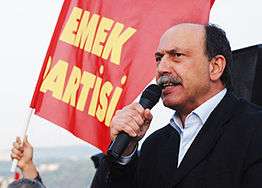
The Labour Party (EMEP) had been a member of the Peoples' Democratic Congress and had participated in the establishment of the HDP in 2012. However, the EMEP released a statement on 17 June 2014, announcing a split with the HDP.[25] The split was attributed to the restructuring of the Kurdish nationalist Peace and Democracy Party into a local-only party under the new name Democratic Regions Party (DBP), while the BDP's parliamentary caucus would be integrated into the HDP. This would, in turn, require the HDP's constitution to be altered in order to ensure greater compliance and conformity with the ideology of the BDP. This caused the EMEP to formally announce their secession from the HDP, but stated that they would continue their participation with the HDK. Despite the split, the Labour Party endorsed the HDP presidential candidate Selahattin Demirtaş for the 2014 presidential election and also announced that they would not be running in the June 2015 general election.[26][27]
Ideology
The HDP is seen as the Turkish variant of the Greek SYRIZA and the Spanish Podemos parties, similar in their anti-capitalist stance. The founders of the HDP, Yavuz Önen and Fatma Gök, both emphasised the HDP's fundamental principle of rejecting capitalism and labour exploitation for the benefit of all Turkish citizens regardless of race, gender or religion. The party in this sense is therefore secular, though has refrained from endorsing the secularism enshrined in the principles of Mustafa Kemal Atatürk. The HDP has also called for a new constitution that enshrines minority rights for Kurds, Alevis and other minorities.[28]
The traditional 'Turkish or Kurdish' dichotomy in Turkish politics arose mainly from the series of Kurdish political parties and their relations to separatist organisations such as the PKK since 1990. This began with the People's Labor Party and continued with the Democracy Party in 1993, the People's Democracy Party in 1994, the Democratic People's Party in 1997, the Democratic Society Party in 2005, the Peace and Democracy Party in 2008 and finally the Democratic Regions Party in 2014. Most of these parties were closed down for violating the constitution by advocating the establishment of an independent Kurdistan on Turkish soil. While the HDP is also affiliated with the Peace and Democracy Party and the Democratic Regions Party, it aims to establish a new perspective that overcomes the traditional Turkish versus Kurdish divide. The HDP instead aims to collectively represent people of all ethnic or religious backgrounds and to safeguard their civil liberties by bringing about direct democracy and an end to capitalist exploitation. The party has long advocated the establishment of local 'people's parliaments' to increase democratic representation and decentralisation of power. Much of the party's attempts to unite citizens throughout Turkey is through the opposition to the governing conservative Justice and Development Party (AKP), which the HDP has accused of being authoritarian, exploitative and discriminatory against religious minorities.[29] The HDP's foreign policy also involves opening the border with Armenia, which has been closed since the 1990s due to Turkey's attempts to weaken Armenia economically in the Nagorno-Karabakh War.
Concerns have been raised whether the HDP respects or supports the unity of the Turkish Republic, especially due to its underground connections with separatist rebel organisations such as the PKK. During a conference in Selahattin Demirtaş's presidential election campaign, the HDP caused controversy by not displaying any Turkish flags. In response, Demirtaş maintained that the HDP respected the flag, stating that the flag represented all citizens of Turkey.[30]
Relations with the Kurdistan Workers' Party
Although the HDP has supported a peace process with Kurdish rebels and supported non-violent protest, it has been accused of maintaining links with militant organisations, most notably the Kurdistan Workers' Party (PKK) and its political organization Kurdistan Communities Union (KCK).[31]
According to some sources and parties, the HDP has direct relations with the PKK. Because of its close relations with the Kurdish nationalist Democratic Regions Party, the HDP has been accused on numerous occasions of being influenced by and openly endorsing the PKK. Turkish pro-government newspaper Hurriyet wrote that during its 2nd Extraordinary Congress, HDP supporters came dressed as PKK guerrillas, with many members during the congress holding banners picturing the PKK's imprisoned founder Abdullah Öcalan. A message by Öcalan was read out in the Congress, which was also attended by Abdullah Öcalan's brother Mehmet Öcalan during solution process.[32]
The AKP İstanbul MP Hüseyin Yayman claimed that despite Öcalan's calls for peace, the PKK were not interested in peace but wanted to secure a geographical region to govern. He claimed that the PKK and the HDP subsequently formed a joint venture to disrupt the solution process as much as possible, accusing the HDP of never calling for the PKK to lay down arms. For his part, Yayman had never demanded that the Turkish army lay down its arms in advance of any ceasefire or peace agreement with the PKK. He further claimed that during the October 2014 riots against the Siege of Kobanî, the HDP had marginalised anyone who wasn't a member of the HDP or PKK.[33]
In the run-up to the 2015 general election, it was alleged that the PKK had influenced the HDP's decision to stand as a party rather than as a group of independent candidates, in order to bypass the 10% election threshold. Dilek Öcalan, the niece of Abdullah Öcalan, was also made a HDP parliamentary candidate.[34] The relationship between the HDP and the PKK has been put forward by the governing Justice and Development Party (AKP) as a reason why it would be better for the HDP to not gain representation in Parliament, though government journalists alleged that this would result in greater violence by the PKK and attempts to establish a separate parliament in Diyarbakır.[35][36] In election posters and propaganda, the HDP has been accused scaremongering and using the PKK to coerce voters into voting for them, stating that the there would be more violence if the HDP failed to pass the election threshold.[37] In contrast, HDP politicians also accused the AKP of scaremongering when they claimed that their affiliation to the PKK made them unfit for parliamentary representation.[35][38] PKK militants have also been accused of raiding local shops and cafes in the south-east of Turkey and demanding votes for the HDP, with one civilian being wounded when a group of PKK youth militants raided a cafe in Silvan.[39][40] Selahattin Demirtaş has denied having an 'organic relationship' with the PKK and claimed that the allegations of PKK militants demanding votes for the HDP from voters was untrue.[41][42]
Kurdish peace process
The Turkish Justice and Development Party (AKP) government began a peace process with the PKK in 2013, consisting of a withdrawal of militants from Turkish soil and negotiations towards the normalisation following nearly 30 years of armed conflict between Kurdish rebels and the Turkish Armed Forces. As a strong advocate of minority rights, the HDP was involved in negotiations with both the government and also the imprisoned PKK leader Abdullah Öcalan on İmralı Island.
Relations with the Justice and Development Party
Despite being a left-wing party, the HDP has been accused of negotiating with the conservative orientated right-wing Justice and Development Party (AKP) behind closed doors on issues mainly surrounding the Solution process to the Kurdish separatist militants. Critics of the government and the HDP alleged that such talks could lead to a potential coalition between the AKP and HDP in the event that the HDP enters parliament and the AKP does not win a majority. Such a coalition could potentially deliver Kurdish nationalist demands to the south-east of Turkey while the HDP support the AKP's long-time policy of introducing a presidential system in place of the existing parliamentary system.[43] In March, AKP Deputy Prime Minister Bülent Arınç claimed that the HDP would be their partners in the solution process and expressed his wish to work in harmony, though also accused some HDP MPs of not working towards lasting peace with sincerity.[44] In contrast, government minister Bekir Bozdağ accused the HDP of being part of an 'international project' intending to destabilise the government of Turkey.[45] Relations seemed to sour in early April, where the HDP accused the AKP of staging a pre-planned attack against PKK members in the province of Ağrı aimed at gathering more votes in the upcoming general election. In response, Deputy Prime Minister Yalçın Akdoğan accused Selahattin Demirtaş of acting like a PKK spokesman. In February 2015, HDP chairwoman Figen Yüksekdağ claimed that a joint statement regarding the solution process could be made with the AKP.[46] Delegations from the AKP and the HDP formally met in the Prime Minister's office in Dolmabahçe Palace in April 2015.[47]
2014 Siege of Kobanî protests
The peace process was nearly disbanded after pro-Kurdish protests and riots broke out in south-eastern Turkey protesting the lack of government intervention against the advance of ISIL militants on the city of Kobanî in Syria, just south of the Turkish border. The HDP openly supported the protests, while calling for non-violence.[48][49] Protestors were met with tear gas and water cannon, leading to more than 40 deaths.[50] Prime Minister Ahmet Davutoğlu heavily criticised the HDP for calling for more protests and responded by drafting a heavily controversial domestic security bill and calling for the HDP to prove itself to be a peaceful political party.[51] Nevertheless, the solution process continued despite the riots, with ISIL being completely ejected from Kobanî by April 2015.[52] HDP MP Altan Tan later claimed that his party had miscalculated the consequences of calling for more protests, although his statements were met with opposition from the confederalist KCK organisation.[53]
Historical leaders
The HDP operates a co-presidential system, whereby the party is chaired by one chairman and one chairwoman, elected during party congresses. Since its establishment in 2012, the party has had a total of six leaders, three men and three women.
Chairpersons
The following is a list of the current and previous chairpersons of the HDP, showing the names, birth and death dates where applicable and also the start and end dates of their leadership.
| No. | Chairman (Born–Died) |
Portrait | Chairwoman (Born–Died) |
Portrait | Term in Office | |
|---|---|---|---|---|---|---|
| 1 | Yavuz Önen (1938–) |  | Fatma Gök (1948–) |  | 15 October 2012 | 27 October 2013 |
| 2 | Ertuğrul Kürkçü (1948–) | Sebahat Tuncel (1975–) | 27 October 2013 | 22 June 2014 | ||
| 3 | Selahattin Demirtaş (1973–) | Figen Yüksekdağ (1971–) | 22 June 2014 | Incumbent | ||
Honorary Presidents
On the HDP congress held on 22 June 2014, the outgoing chairpersons Ertuğrul Kürkçü and Sebahat Tuncel were declared the Honorary Presidents of the party. They are the first two co-presidents to serve in that capacity.
| No. | President (male) (Born–Died) |
Portrait | President (female) (Born–Died) |
Portrait | Term in Office | |
|---|---|---|---|---|---|---|
| 1 | Ertuğrul Kürkçü (1948–) | Sebahat Tuncel (1975–) | 22 June 2014 | Incumbent | ||
Party congresses
The party has held several ordinary congresses throughout different cities, mostly focussing on provinces in south-eastern Turkey. So far, the party has had two nationwide extraordinary congresses, held in 2013 and 2014, where elections were held to select the chairpersons of the party.
1st Extraordinary congress, 2013
The party's 1st extraordinary congress was held in the Ahmet Taner Kışlalı Stadium in Ankara on 27 October 2013. The HDP Executive Board and the Congressional Preparation Council both recommended Ertuğrul Kürkçü and Sebahat Tuncel for the positions of chairman and chairwoman respectively, after which both formally assumed their positions. The congress focussed mainly in voicing support for the Gezi Park protests. A message from imprisoned PKK leader Abdullah Öcalan, emphasising the party's support for a decentralisation of power and for the establishment of localised 'people's parliaments', was also read out. 105 sitting and 25 reserve members were elected to the Party Council.[54]
2nd Extraordinary congress, 2014
The party's 2nd extraordinary congress was again held in the Ahmet Taner Kışlalı Stadium on 22 June 2014. 156 delegates were eligible to cast votes to elect the new chairman and chairwoman. Since a majority could not be secured in the first two rounds of voting, the leadership election proceeded into a third round where Selahattin Demirtaş was elected as the chairman and Figen Yüksekdağ was elected as the chairwoman of the party. Speeches by the elected leaders mainly centred on the corruption within the Turkish government and also opposition to the established political system.[55] 100 sitting and 50 reserve members for the Party Council were elected. Outgoing chairpersons Ertuğrul Kürkçü and Sebahat Tuncel were declared Honorary Presidents of the party.[56]
Electoral performance
Formed in 2012, the HDP has only since contested one local, one presidential and one general election. A summary of the results and number of candidates elected is shown below.
Local elections
| Local elections | |||||||
|---|---|---|---|---|---|---|---|
| Election date | Party leaders | Combined votes of all four elections |
Percentage | Municipalities | Councillors | ||
| Metropolitan | District | Municipal | Provincial | ||||
| 2014 | Selahattin Demirtaş Figen Yüksekdağ | 5,149,206 | 4.01 | 0 / 30 | 0 / 1,351 | 9 / 20,458 | 1 / 1,251 |
2014 local elections
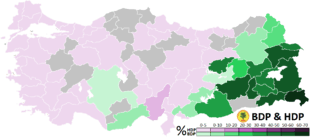
At the 2014 municipal elections, HDP ran parallel to BDP, with the BDP running in Turkey's Kurdish-dominated southeast while the HDP competed in the rest of the country[57] except Mersin Province and Konya Province where BDP launched its own candidates.[58]
After the local elections, the two parties were re-organised in a joint structure. On 28 April 2014, the entire parliamentary caucus of BDP joined HDP, whereas BDP (itself re-organised as the Democratic Regions Party by July) was assigned exclusively to representatives on the local administration level.[59][60]
Presidential elections
| Presidential elections | ||||
|---|---|---|---|---|
| Election date | Candidate | Votes | Percentage | Position |
| 2014 | Selahattin Demirtaş | 3,958,048 | 9.77 | 3rd |
2014 presidential election
.png)
Selahattin Demirtaş was announced as the HDP's candidate for the Presidency on 30 June. In a campaign dominated by the Solution process with Kurdish rebels, he claimed on 5 August in Van that the government of Recep Tayyip Erdoğan had not done enough to bring forward promised legislation, and that the process would collapse immediately if the AKP did not do more to bring lasting peace in the southeast.[61]
On 15 July, Demirtaş outlined his road-map for his presidency should he win the election. In a speech lasting just under an hour, he proposed that the Presidency of Religious Affairs (Diyanet) should be disbanded, that compulsory religion lessons in schools should be removed and that Cemevis (the Alevi houses of worship) should receive national recognition.[62] He also proposed the introduction of "People's Parliaments" (Cumhur meclisleri), which would also incorporate Youth Parliaments to increase representation of young citizens.[63] Pushing for a new constitution, Demirtaş outlined the need to end the non-representation of different cultures, languages, races and beliefs without delay to ensure national stability.[64] Also in his speech, he praised the Gezi Park protests and displayed photos of himself during the events. He continued to direct applause to the mother of the murdered teenager Berkin Elvan, who died 269 days after being hit by a tear gas canister during the protests and falling into a coma.[65] On the issue of the lack of Turkish flags within the hall in which he was delivering his speech, Demirtaş stated that the Turkish flag represented all citizens of Turkey.[66] His slogan is "Bir Cumhurbaşkanı Düşün" (Imagine a President...), which is followed by several different phrases, such as "Bir Cumhurbaşkanı Düşünün Ayrımcılık yapmıyor. Birleştiriyor, barıştırıyor." (Imagine a President who doesn't Discriminate, who Unites and makes Peace) or "Bir Cumhurbaşkanı Düşünün Herkese Demokrat" (Imagine a President who is Democratic to Everybody).[62] Most of the votes that were cast for Demirtaş were from the Kurdish south-east.
| Votes obtained by the HDP presidential candidate Selahattin Demirtaş by province | ||||||||||||||||||||||||||||||||||||||||||||||||||||||||||||||||||||||||||||||||||||||||||||||||||||||||||||||||||||||||||||||||||||||||||||||||||||||||||||||||||||||||||||||||||||||||||||||||||||||||||||||||||||||||||||||||||||||||||||||||||||||
|---|---|---|---|---|---|---|---|---|---|---|---|---|---|---|---|---|---|---|---|---|---|---|---|---|---|---|---|---|---|---|---|---|---|---|---|---|---|---|---|---|---|---|---|---|---|---|---|---|---|---|---|---|---|---|---|---|---|---|---|---|---|---|---|---|---|---|---|---|---|---|---|---|---|---|---|---|---|---|---|---|---|---|---|---|---|---|---|---|---|---|---|---|---|---|---|---|---|---|---|---|---|---|---|---|---|---|---|---|---|---|---|---|---|---|---|---|---|---|---|---|---|---|---|---|---|---|---|---|---|---|---|---|---|---|---|---|---|---|---|---|---|---|---|---|---|---|---|---|---|---|---|---|---|---|---|---|---|---|---|---|---|---|---|---|---|---|---|---|---|---|---|---|---|---|---|---|---|---|---|---|---|---|---|---|---|---|---|---|---|---|---|---|---|---|---|---|---|---|---|---|---|---|---|---|---|---|---|---|---|---|---|---|---|---|---|---|---|---|---|---|---|---|---|---|---|---|---|---|---|---|---|---|---|---|---|---|---|---|---|---|---|---|---|---|---|---|
|
General elections
| Election | Leader | Vote | Result | Seats | Position | Map | |
|---|---|---|---|---|---|---|---|
| 7 June 2015 | Selahattin Demirtaş Figen Yüksekdağ | 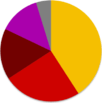 6,058,489 | 13.12% | 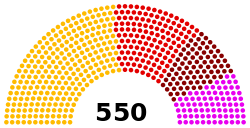 80 / 550 ( | #4th Interim election government |  | |
| 1 November 2015 | Selahattin Demirtaş Figen Yüksekdağ | 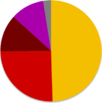 5,144,108 | 10.75% | 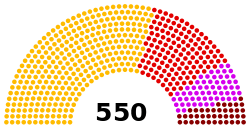 59 / 550 ( | #3rd Opposition | .png) | |
June 2015 general election
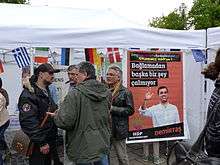
Emboldened by the 9.77% of the vote won by HDP co-leader Selahattin Demirtaş in the 2014 presidential election the HDP contested the election by fielding party candidates rather than independent candidates. This was controversial since most of the HDP's votes would be transferred to the AKP in the event that the HDP failed to win above 10% of the vote. There was speculation as to whether the AKP forced Öcalan to pressure the HDP to contest the election as a party in order to boost their own number of MPs.[67] The party charged a ₺2,000 application fee for prospective male candidates, a ₺1,000 fee for female and young candidates under the age of 27 and no fee was collected from disabled applicants. Applications for candidacy were received between 16 February and 2 March.[68]
According to a private poll conducted by the HDP in January 2015, the party needed to gather around 600,000 more supporters by the general election in order to surpass the election threshold of 10% and win 72 MPs.[69][70] Polling organisations such as Metropoll, however, predicted that the party would win around 55 MPs if they won more than 10%.[71] HDP candidates hoped that the victory of the left-wing SYRIZA in the January 2015 Greek legislative election in January would result in a boost in popularity.[72]
In order to maximise their votes, the party's co-leader Figen Yüksekdağ announced that the HDP would begin negotiations with the United June Movement, a socialist intellectual and political platform that includes left-wing parties such as the Freedom and Solidarity Party (ÖDP) and the Labour Party (EMEP). Negotiations between parties began taking place in early 2015, with the intention of forming a broad alliance rather than a strict political coalition. Although Yüksekdağ ruled out negotiating with the CHP since they were 'closed to dialogue' and Demirtaş was opposed to negotiations, CHP deputy leader Sezgin Tanrıkulu said that the CHP was open for talks and that the two parties had until 7 April to come to an agreement.[73]
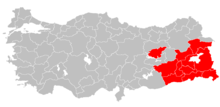
HDP rallied more than expected and gained 13.12% of the total votes cast (6,280,302 out of 46,774,793), breaking the 10% threshold, the minimum set for any Turkish political party to have its representatives sit in the Grand National Assembly of Turkey (TBMM), and securing 81 seats. The HDP carried victories in 14 out of 85 electoral districts in Turkey: Ardahan, Kars, Iğdır, Ağrı Province, Muş, Bitlis, Van, Turkey, Hakkâri, Şırnak, Siirt, Batman, Mardin, Diyarbakır and Tunceli. These electoral districts are mostly Kurdish-majority provinces. In this election, however, the HDP departed from its traditional Kurdish issues-focused role and embraced other minority ethnic and religious groups in Turkey, women's issues, LGBT and left-wing activists and political groups under its wing, promoting its appeal to a national level and drawing a wider pool of support from all over Turkey. This resulted the HDP to be not only the 4th largest political party in the Grand National Assembly of Turkey but also a formidable force in gaining the Turkish overseas votes, ranking 2nd after the AKP with 20.41% and carrying Japan, Ukraine, Greece, Poland, Italy, Switzerland, Sweden, Finland, Canada and the U.K. The HDP also derailed the AKP from being the majority party, forming a single-party government and reaching 330 seats in the Grand National Assembly of Turkey, the necessary number to enact a referendum necessary to change the constitution so that Turkey would abandon its traditional parliamentary government and instead adopt an American-style executive presidency government. This is hailed by Turkey's opposition parties and their supporters as the biggest contribution the HDP made to the Republic of Turkey.
Parliamentary politicians
- Meral Danış Beştaş
- Behçet Yıldırım
- Berdan Öztürk
- Dirayet Taşdemir
- Leyla Zana
- Sırrı Süreyya Önder
- Ayşe Acar Başaran
- Mehmet Ali Aslan
- Saadet Becerekli
- Hişyar Özsoy
- Mahmut Celadet Gaydali
- Mizgin Irgat
- Nursel Aydoğan
- İdris Baluken
- Çağlar Demirel
- Nimettullah Erdoğmuş
- Ziya Pir
- Altan Tan
- İmam Taşçıer
- Feleknas Uca
- Sibel Yiğitalp
- Mahmut Toğrul
- Nihat Akdoğan
- Selma Irmak
- Abdullah Zeydan
- Mehmet Emin Adıyaman
- Erdal Ataş
- Pervin Buldan
- Selahattin Demirtaş
- Celal Doğan
- Hüda Kaya
- Filiz Kerestecioğlu Demir
- Garo Paylan
- Müslüm Doğan
- Ertuğrul Kürkçü
- Ayhan Bilgen
- Ali Atalan
- Erol Dora
- Mithat Sancar
- Gülser Yıldırım
- Dengir Mir Mehmet Fırat
- Burcu Çelik Özkan
- Ahmet Yıldırım
- Besime Konca
- Kadri Yıldırım
- İbrahim Ayhan
- Osman Baydemir
- Dilek Öcalan
- Leyla Birlik
- Ferhat Encu
- Aycan İrmez
- Faysal Sarıyıldız
- Alican Önlü
- Lezgin Botan
- Adem Geveri
- Tuğba Hezer Öztürk
- Bedia Özgökçe Ertan
- Nadir Yıldırım
- Figen Yüksekdağ
References
- ↑ "Halkların Demokratik Partisi". General Public Prosecutor's Office of the Supreme Court of Appeals. 30 December 2015. Retrieved 19 February 2016.
- ↑ "A setback for Kurdish self-rule?". Al Jazeera. 15 June 2015. Retrieved 1 August 2015.
- ↑ Mustafa Akyol (13 May 2015). "Why I may vote for Kurdish nationalists". Hürriyet Daily News. Retrieved 1 August 2015.
- ↑ "Court orders ban on HDP election brochures for promoting 'self-governance'". 19 October 2015. Retrieved 19 February 2016.
- ↑ "Demirtaş: Çoğulculuk, Bölünmemenin Teminatıdır". Sondakika.com. 25 July 2014. Retrieved 1 August 2015.
- ↑ Celep 2014, p. 166.
- ↑ "PES congratulates associate parties HDP and CHP with historic election result". Party of European Socialists. 8 June 2015.
- ↑ "Consultative parties". Socialist International. Retrieved 19 February 2016.
- ↑ "HDP'ê Beyannameya Xwe ya Hilbijartinê Aşkera Kir". trtnuce.com. 2015-04-21. Retrieved 2015-09-01.
- ↑ "Turkey's Pro-Kurdish HDP Bets on New Voters to Exceed Threshold in June Polls". New York Times. 13 April 2015. Retrieved 4 June 2015.
- ↑ Mynet. "Hdp Heyeti İmralı'Dan Döndü Haberi ve Son Dakika Haberler Mynet". Mynet Haber. Retrieved 7 June 2015.
- ↑ "HDP İki KCK'lı İçin Harekete Geçti". Haberler.com. 31 March 2015. Retrieved 7 June 2015.
- ↑ "HDP KCK üyelerini de aday gösterecek". Ensonhaber. Retrieved 7 June 2015.
- ↑ "BDP lawmakers join sister-party HDP - POLITICS". hurriyetdailynews.com.
- ↑ "Inclusive HDP candidate list aspires to pass 10 pct election threshold". Hurriyet Daily News. 7 April 2015. Retrieved 10 April 2015.
- ↑ "HDP'den MHP'nin Doğu'daki Kalesine Azeri Kadın Aday". Haberler. 8 April 2015. Retrieved 10 April 2015.
- ↑ "HDP'den Laz Aday Adayı". Bizim Kocaeli. 25 February 2015. Retrieved 10 April 2015.
- ↑ First-ever openly gay parliamentary candidate stands for election in Turkey The Independent, 25 May 2015. Retrieved 7 June 2015.
- ↑ Red Bilisim. "HDK Bileşeni Kurumlar - Halkların Demokratik Kongresi". Retrieved 7 June 2015.
- 1 2 "HDK partileşti HDP oldu". 18 October 2012. Retrieved 7 June 2015.
- ↑ "Yavuz Önen biyografisi burada ünlülerin biyografileri burada". biyografi.net. Retrieved 2015-08-01.
- ↑ Red Bilisim. "Halkların Demokratik Partisi (HDP) Eş Başkanları Fatma Gök ve Yavuz Önen: "Başarmaktan başka çaremiz yok" - Halkların Demokratik Kongresi". Retrieved 7 June 2015.
- ↑ Bariş Avşar (22 October 2012). "'Kongre'si bitmeyen parti kuruldu". Radikal. Retrieved 7 June 2015.
- ↑ "3 BDP'li vekil istifa etti". Radikal.
- ↑ Mustafa Mayda. "Yeni HDP'ye Dair Açıklama". Emek Partisi (EMEP). Retrieved 7 June 2015.
- ↑ Mustafa Mayda. "Halkı Temsil Edecek Cumhurbaşkanı Adayımız Selahattin Demirtaş". Emek Partisi (EMEP. Retrieved 7 June 2015.
- ↑ Piri Medya (7 June 2015). "İşte seçimlere katılacak 31 parti". Yeni Şafak. Retrieved 7 June 2015.
- ↑ Zeynep GÜRCANLI- Aysel ALP. "HDP seçim bildirgesini açıkladı". HÜRRİYET - TÜRKİYE'NİN AÇILIŞ SAYFASI. Retrieved 7 June 2015.
- ↑ Cansu ÇAMLIBEL. "Otoriter lidere alternatifim". HÜRRİYET - TÜRKİYE'NİN AÇILIŞ SAYFASI. Retrieved 7 June 2015.
- ↑ "Demirtaş'tan Türk Bayrağı mesajı". ZAMAN. 15 July 2014. Retrieved 7 June 2015.
- ↑ "Methodological differences of the PKK, KCK and HDP". DailySabah. 25 December 2014. Retrieved 7 June 2015.
- ↑ Okan KONURALP / ANKARA. "HDP'den PKK şov". HÜRRİYET - TÜRKİYE'NİN AÇILIŞ SAYFASI. Retrieved 7 June 2015.
- ↑ "Hüseyin Yayman: PKK barış istemiyor". Haber7. 30 September 2014. Retrieved 7 June 2015.
- ↑ "HDP listesinde kadın adaylar ve azınlıklar öne çıkıyor". BBC Türkçe. Retrieved 7 June 2015.
- 1 2 "AKP officials insinuate HDP-PKK link, HDP outraged". TodaysZaman. 24 April 2015. Retrieved 7 June 2015.
- ↑ "PKK'dan HDP için bomba seçim kehaneti". Internethaber. Retrieved 7 June 2015.
- ↑ Ulusal Kanal (3 May 2015). "PKK'dan baraj tehdidi: HDP barajın altında kalırsa...". Ulusal Kanal. Retrieved 7 June 2015.
- ↑ "PKK/HDP'nin korku siyaseti". 4 May 2015. Retrieved 7 June 2015.
- ↑ "PKK kahvehane basıp oy istedi!". 28 April 2015. Retrieved 7 June 2015.
- ↑ "PKK'dan 'HDP'ye oy verin' baskısı". takvim.com.tr.
- ↑ "Selahattin Demirtaş Habertürk'e açıkladı: PKK ile organik bağımız yok". www.haberturk.com. 22 April 2015. Retrieved 7 June 2015.
- ↑ "Ağrı'da AKP-HDP 'alan mücadelesi' mi yaşanıyor?". BBC Türkçe. Retrieved 7 June 2015.
- ↑ "'AKP-HDP başkanlık sisteminde anlaştı'". 20 February 2015. Retrieved 7 June 2015.
- ↑ DigitalSecure Ltd. HyperMedia Co. Negaresh NewsRoom Ver 5.0. "Kurdpress News Aganecy - Some HDP figures not 'sincere' in solution process: Bulent Arinc". Retrieved 7 June 2015.
- ↑ "BEKİR BOZDAĞ: "HDP'NİN PARTİ OLARAK SEÇİME GİRMESİ BİR PROJEDİR"". Retrieved 7 June 2015.
- ↑ "BREAKING! HDP: Negotiation Stage in Solution Process Could Begin Within 2 Weeks". Retrieved 7 June 2015.
- ↑ Anadolu Ajansı (c) 2011. "HDP: Divisions hindering Turkey's solution process". aa.com.tr.
- ↑ "Pro-Kurdish party leader calls for end to violence in Kobani protests". TodaysZaman. 9 October 2014. Retrieved 7 June 2015.
- ↑ "HDP, Kobani için yine sokak çağrısı yaptı". 29 October 2014. Retrieved 7 June 2015.
- ↑ "Turkish PM Unveils Tighter Security Steps After Deadly Protests". VOA. Retrieved 7 June 2015.
- ↑ "Turkish PM slams pro-Kurdish HDP calls for Kobani protests". Retrieved 7 June 2015.
- ↑ "HDP: Turkish-Kurdish solution process has passed Kobani crisis". Retrieved 7 June 2015.
- ↑ "HDP deputy, KCK member argue over Kobani protests". DailySabah. 23 October 2014. Retrieved 7 June 2015.
- ↑ "HDP Olağanüstü Kongresi tamamlandı: Yeni eşbaşkanlar Tuncel ve Kürkçü". Sendika.Org. Retrieved 7 June 2015.
- ↑ "HDP Eş Genel Başkanlığı'na Selahattin Demirtaş ve Figen Yüksekdağ seçildi". Radikal. Retrieved 7 June 2015.
- ↑ Ertuğrul Kürkçü
- ↑ Cengiz, Orhan Kemal (31 October 2013). "New Kurdish Party Could Impact Local Turkish Elections". Sibel Utku Bila (trans.). Al-Monitor. Retrieved 24 February 2014.
- ↑ ADAYLARIMIZ, BDP official website
- ↑ "BDP milletvekilleri HDP'ye katıldı". Al-Monitor. 28 April 2014. Retrieved 24 February 2014.
- ↑ "BDP artık Meclis'te yok". odatv.com. Retrieved 7 June 2015.
- ↑ "Demirtaş: Barış sürecinin bozulmaması gerekir – Milliyet Haber". Milliyet.com.tr.
- 1 2 "'Diyanet kaldırılmalı, cemevleri yasal statüye kavuşturulmalı'". Yurtgazetesi.com.tr.
- ↑ Temmuz 15, 2014 (15 July 2014). "Demirtaş'tan Türk bayrağı mesajı- Sözcü Gazetesi". Sozcu.com.tr.
- ↑ ali (15 July 2014). "Selahattin Demirtaş Yol Haritasını Açıkladı". Wanhaber.com.
- ↑ "Demirtaş Köşk için yol haritasını açıkladı". Dunya.com. 15 July 2014.
- ↑ "Demirtaş yol haritasını açıkladı – TG". Turkiyegazetesi.com.tr. 15 July 2014.
- ↑ "nediyor.com". nediyor.com. Retrieved 7 June 2015.
- ↑ "Aday Adaylarından partilerin alacakları ücretler". Siirtliler. 14 February 2015. Retrieved 7 June 2015.
- ↑ "HDP'nin 'yeni' oy kaynağı!". Radikal. Retrieved 7 June 2015.
- ↑ Oktay Özilhan. "İşte Demirtaş'ın elindeki anket:Baraj için 600 bin oy daha !". Taraf Gazetesi. Retrieved 7 June 2015.
- ↑ "HDP ve genel seçimler üzerine 7 soru". www.haberturk.com. 31 January 2015. Retrieved 7 June 2015.
- ↑ "Syriza'nın Seçim Başarısı HDP'yi Ümitlendirdi". Haberler.com. 26 January 2015. Retrieved 7 June 2015.
- ↑ "BBC: Seçimler için Türkiye solunda ittifak arayışları". Ensonhaber. Retrieved 7 June 2015.
Bibliography
- Celep, Ödül (2014). "Can the Kurdish Left contribute to Turkey's democratization?" (PDF). Insight Turkey. 16 (3): 165–180.
External links
- Official website (Turkish) (English)
 Media related to Peoples' Democratic Party (Turkey) at Wikimedia Commons
Media related to Peoples' Democratic Party (Turkey) at Wikimedia Commons